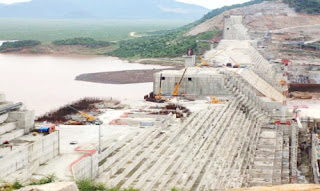Hotspot: the Grand Ethiopian Renaissance Dam
Other important things did happen last month. They just didn’t make headlines. One was Sudan stepping in to mediate a bitter dispute between Ethiopia and Egypt in which President Sisi said he would use ‘all available means’ to defend Egypt’s interests. That’s fighting talk.
 The Nile is the lifeblood of Egypt, with over 95 per cent of the population living along its banks and delta
The Nile is the lifeblood of Egypt, with over 95 per cent of the population living along its banks and delta
 Addis Ababa says it has had to mostly rely on raid-fed agriculture which periodically leaves millions of Ethiopians vulnerable to food shortages
Addis Ababa says it has had to mostly rely on raid-fed agriculture which periodically leaves millions of Ethiopians vulnerable to food shortages
The dispute is over the Grand Ethiopian Renaissance Dam (GERD) being built on a tributary of the Blue Nile. Ethiopia says it will begin part filling it in July in order to test two turbines next year during the rainy season. The dam is 71 per cent complete and when finished in 2023 will be the largest hydroelectric dam in Africa providing desperately needed power to a country of 100 million people.
The reservoir will be able to hold more than 70 billion cubic metres (bcm) of water, but Egypt says if it operates according to Ethiopian intentions, 100 million Egyptians will then be deprived of much of their lifeline – the waters of the river.
The passions on each side are understandable. Upstream, Addis Ababa says it has had to mostly rely on rain-fed agriculture which periodically leaves millions of Ethiopians vulnerable to food shortages. Many Ethiopians view Egypt as a colonial power which helped the slave trade, attempted to invade them, and which contributes to poverty in their country.
Downstream, every Egyptian knows that for them, the Nile is a matter of life or death. Egypt is a desert and so 95 per cent of the population live along the river’s banks and delta. If measured only by the land upon which people live, it would be one of the world’s most densely populated countries. Cairo argues that the GERD will put five million farmers out of work, cut agricultural production by half, and further destabilize a country rocked by an Islamist insurgency.
This year, after an American-led initiative broke down, Sisi instructed Egypt’s military to prepare for the possibility of action. The Ethiopians were not cowed. Both sides remember Egypt’s failed invasion of Ethiopia in 1974, and, with the top brass busy making money in factories and construction the army is in no shape for a major war. The Egyptian F-16s and Rafael jets lack refuelling capability to get them back home even if they could avoid the missile defence system around the thick reservoir walls. Last month, Ethiopia’s senior command visited the site and vowed to ‘retaliate if there are any attacks’.
So, mediation is the way ahead despite several US deadlines for resolution having passed. The Sudanese effort came last month after Ethiopia stayed away from a February round of talks in Washington because the Americans favour delaying the turbine testing.
The negotiating starting point is a number of colonial era agreements, and the 1929 Anglo-Egyptian Treaty. It gave Egypt an annual allocation of water plus veto over any attempt by an upstream state to construct dams along the river. Ethiopia, which was not colonized, argues that it is not bound by agreements it didn't sign.
Ethiopia insists it will begin to part fill the reservoir this year to a depth allowing them to test the turbines in 2021, and then fill it to the 74 billion cubic metres of water capacity by 2024. It says the Egyptians will come to see that this will not have a significant impact on their supply. Egypt proposes a 7 to 15-year filling process, and a reduction in both capacity and the dam’s height. Ethiopia has offered to guarantee Egypt 31 bcm a year, Egypt insists on 40 bcm.
The Americans are still involved, but Sudan’s Sovereign Council now says it will work to bridge these gaps and ‘reach an agreement’. That is going to be tough. Khartoum is where the Blue Nile meets the White, giving it weight in any proceedings but the problem is Egypt believes Khartoum is throwing its weight behind Ethiopia. Sudan has close economic ties with Ethiopia, has supported the project since 2013, and believes it will benefit from a share of electricity produced. It also insisted its name was removed from a 5 March Arab League statement rejecting ‘any form of infringement on Egypt's historical rights to the waters of the River Nile’.
It looks as if the Egyptians are going to have to compromise – a total breakdown of relations with Ethiopia cannot be to their advantage. The Greek historian Herodotus described Egypt as the gift of the Nile – but what the Nile gives, the Grand Ethiopian Renaissance Dam can take away.
Source: Geographical




Comments
Post a Comment